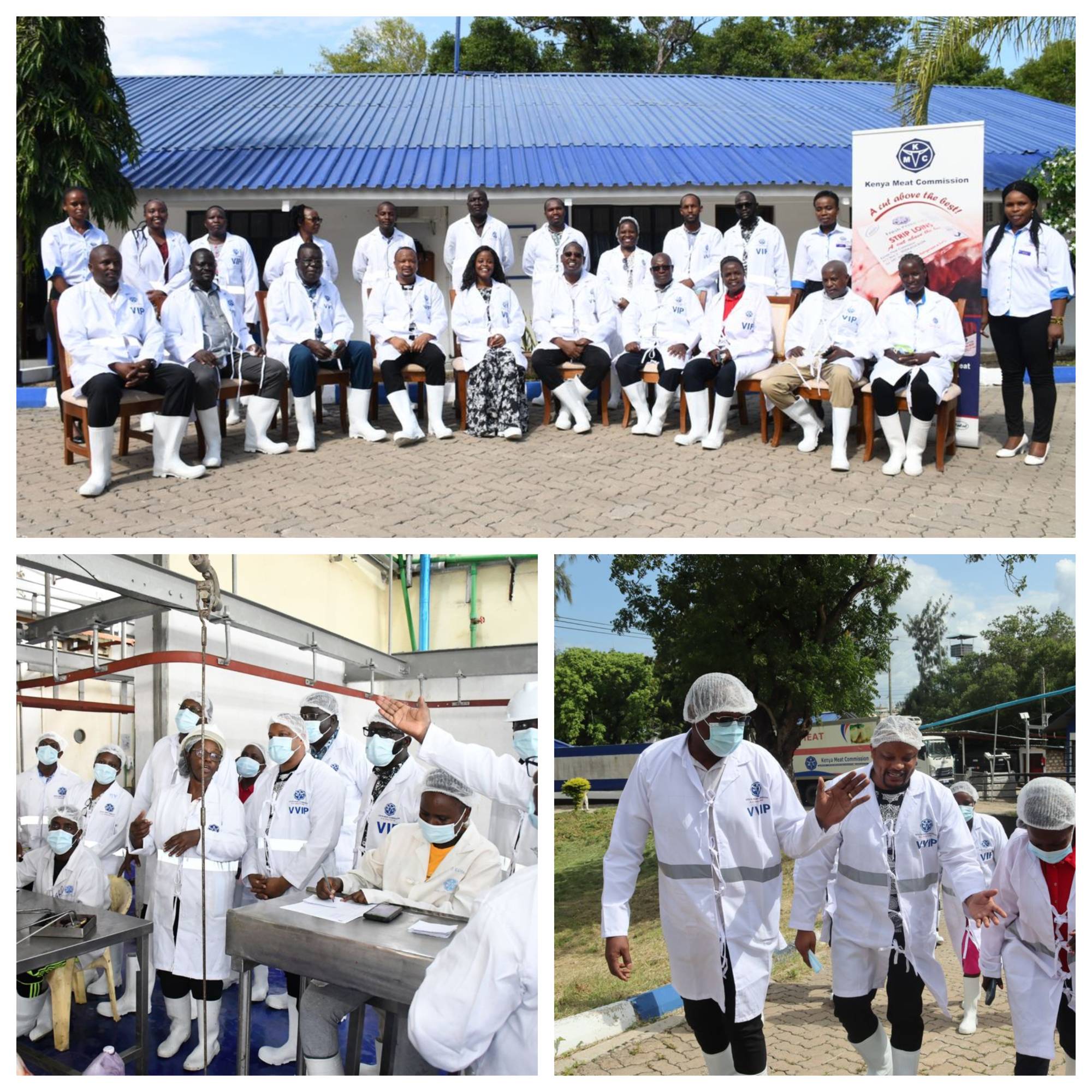𝗞𝗘𝗡𝗬𝗔 𝗠𝗘𝗔𝗧 𝗖𝗢𝗠𝗠𝗜𝗦𝗦𝗜𝗢𝗡 𝗢𝗡 𝗧𝗥𝗔𝗖𝗞 𝗧𝗢𝗪𝗔𝗥𝗗𝗦 𝗖𝗢𝗠𝗠𝗘𝗥𝗖𝗜𝗔𝗟 𝗩𝗜𝗔𝗕𝗜𝗟𝗜𝗧𝗬; 𝗡𝗔𝗧𝗜𝗢𝗡𝗔𝗟 𝗔𝗦𝗦𝗘𝗠𝗕𝗟𝗬 𝗔𝗚𝗥𝗜𝗖𝗨𝗟𝗧𝗨𝗥𝗘 𝗖𝗢𝗠𝗠𝗜𝗧𝗧𝗘𝗘 𝗧𝗢𝗟𝗗
In a recent inspection visit to the Kenya Meat Commission (KMC) Facility in Kibarani, Mombasa, the National Assembly Committee on Agriculture and Livestock, chaired by Hon. Dr. John Mutunga, met with Managing Commissioner Brigadier J.N. Githaiga. The committee, responsible for budget oversight, delved into detailed discussions regarding the state corporation's operations, assets, and finances.
During the visit, the Committee Members had the opportunity to tour the refurbished meat processing plant, which currently handles 250 large stock and 500 small stock per day. They also examined the chilling facilities, which can accommodate 1750 animals operating at temperatures ranging between 0 and 2 degrees Celsius.
Lawmakers were provided with insights into KMC's strategic plan by Managing Commissioner J.N. Githaiga, who highlighted the company's ongoing efforts to enhance its operations. A notable development revealed during the visit was KMC's intention to introduce sausages to Kenyan supermarkets, thereby expanding its product range.
Brigadier J.N. Githaiga emphasized KMC's unrivaled efficiency of its meat processing plants, along with its ability to process high volumes of quality meat in line with consumer tastes and preferences.
Documents before the Committee revealed that KMC had been allocated Ksh 200 million in funds, which will be utilized for rehabilitating the canning line, installing a new borehole, establishing a water recycling plant, and developing renewable energy sources like solar and biogas production. Additionally, KMC aims to obtain ISO certification to bolster its credibility and competitiveness in the market.
Regarding the question of KMC's commercial viability, Hon. Monica Marubu, MP of Lamu County, inquired about the progress made in reducing reliance on government funding. Brigadier Githaiga informed the committee members that KMC has been gradually decreasing its dependence on government funding, with 70% of its resources now being internally generated. The company plans to further diversify its revenue streams through exports, franchise shops, and partnerships within the hotel and tourism industry.
However, despite its positive trajectory, KMC faces a number of challenges that need to be addressed for sustained commercial viability. The company grapples with aging machinery and equipment, negatively impacting its productivity and efficiency. Furthermore, drought conditions have affected the supply of animals for processing, and delayed payments from government agencies have created cash flow challenges. Additionally, land disputes and limitations in international certification have hindered the exploration of untapped export markets.
While KMC inherited 74 court cases during its revival, significant progress has been made in resolving them. Presently, only 8 cases remain pending, thanks to the allocation of exchequer funds, which have helped clear financial debts and litigation.
Being the oldest and most experienced meat processor in Kenya and the larger East African region, KMC holds immense potential to contribute to the country's economy. Through strategic investments, improved operations, and a focus on quality products, the company aims to achieve commercial viability and expand its presence in both domestic and international markets.
Members of the National Assembly Committee on Agriculture and Livestock asserted their commitment to monitoring KMC's progress and providing necessary support to overcome the challenges it faces.
















